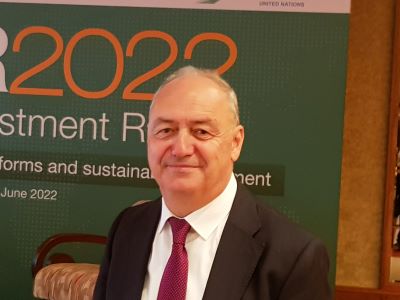MANAMA: Mahmood Rafique, Editor: Flows of foreign direct investment (FDI) recovered to pre-pandemic levels 2021, hitting nearly $1.6 trillion but the prospects for 2022 are grimmer, according to the UNCTAD World Investment Report.
The World Investment Report 2022 launched by the United Nations Conference on Trade and Development (UNCTAD) said that sustainability themed investment products in global financial markets rose by 63% from 2020 and governments around the world seek to develop regulatory frameworks for sustainable finance.
The launch of WIR 2022 held in Manama simultaneously with Geneva and Dr Astrit Salstarowa, Chief, Trends and Data Section, Division of Investment and Enterprise at UNCTAD and Dr Zakariya Hejres, Chairman of Board, MENA Centre for Investment also attended the launch.
The report entitled “International tax reforms and sustainable investment” said that to cope with an environment of uncertainty and risk aversion, developing countries must get significant help from the international community.
“The need for investment in productive capacity, in the Sustainable Development Goals (SDGs) and in climate change mitigation and adaptation is enormous. Current investment trends in these areas are not unanimously positive,” Rebeca Grynspan, Secretary-General of United Nations Conference on Trade and Development (UNCTAD), said.
“It is important that we act now. Even though countries face very alarming immediate problems stemming from the cost-of-living crisis, it is important we are able to invest in the long term.”
Coming off a low base in 2020, global FDI flows rose 64 percent to $1.58 trillion last year with momentum from booming merger and acquisition (M&A) activity and rapid growth in international project finance due to loose financing and major infrastructure stimulus packages.
Explore UNCTAD’s interactive data visualization on FDI inflows and outflows in countries and regions over the last 30 years.
While the recovery benefitted all regions, almost three-quarters of the growth was concentrated in developed economies as FDI flows rose 134% and multinational companies posted record profits.
Flows to developing economies rose 30% to $837 billion – the highest level ever recorded – largely due to strength in Asia, a partial recovery in Latin America and the Caribbean and an upswing in Africa. The share of developing countries in global flows remained just above 50%.
The reinvested earnings component of FDI – profits retained in foreign affiliates by multinational companies – accounted for the bulk of the global growth, reflecting the record rise in corporate profits, especially in developed economies.
The top 10 economies for FDI inflows in 2021 were the United States, China, Hong Kong (China), Singapore, Canada, Brazil, India, South Africa, Russia and Mexico.
2022 prospects
This year, the business and investment climate has changed dramatically as the war in Ukraine results in a triple crisis of high food and fuel prices and tighter financing. Other factors clouding the FDI horizon include renewed pandemic impacts, the likelihood of more interest rate rises in major economies, negative sentiment in financial markets and a potential recession.
Despite high profits, investment by multinational companies in new projects overseas were still one-fifth below pre-pandemic levels last year. For developing countries, the value of greenfield announcements stayed flat.
Signs of weakness are already emerging this year. Preliminary data for the first quarter shows greenfield project announcements down 21% globally, cross-border M&A activity down 13% and international project finance deals down 4%.
“UNCTAD foresees that the growth momentum of 2021 cannot be sustained and that global FDI flows in 2022 will likely move on a downward trajectory, at best remaining flat,” the report underline. “However, even if flows should remain relatively stable in value terms, new project activity is likely to suffer more from investor uncertainty.”



